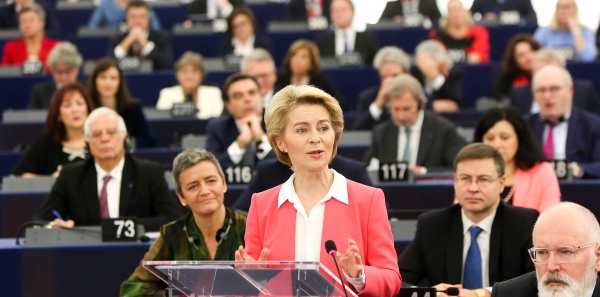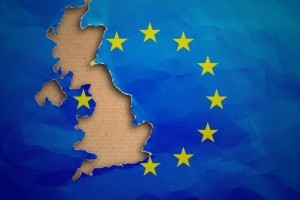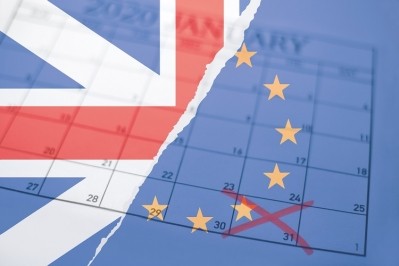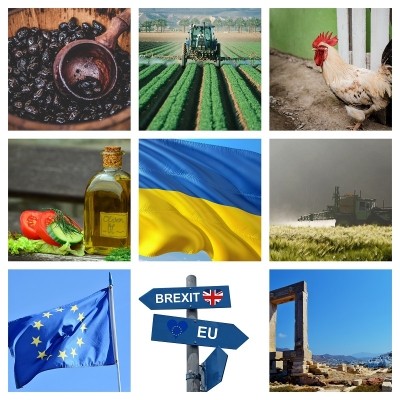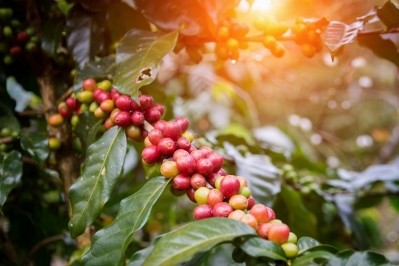What does the new von der Leyen Commission mean for the food industry in 2020 and beyond?

On 1st December 2019, the recently-elected von der Leyen Commission entered into European Parliament, where they will reside for the next five years. The new President, Ursula von der Leyen, is first woman Commission President is the and her team has the greatest number of female Commissioners to date.
In a speech given on 27th November 2019, the President expressed: “People care about the air they breathe, the water they drink, the food they eat and the nature they cherish.”
While von der Leyen highlighted how “twin transitions – climate and digitalisation – will bring changes for all”, in her speech, she proclaimed “let there be no doubt: Farming will remain a valued part of our culture and our future”.
Explaining how two of her Commission members, Virginijus Sinkevičius and Janusz Wojciechowski will seek to improve the food and agriculture environment, von der Leyen said: “Virginijus Sinkevičius will be leading Europe’s fight to preserve our biodiversity and oceans while ensuring our coastal and fishing communities can thrive. And we have Janusz Wojciechowski who will ensure that our farmers can also thrive as they adapt to new realities.”
Hailing her Commission as ‘a union that strives for more’, von der Leyen set the backdrop for the Commission's plans on food safety and security by stating: “My Commission will be a geopolitical Commission committed to sustainable policies.”
Farm to Food Strategy
Health protection and food safety is a key area in European regulations as we move into 2020. The European Union’s (EU) farm to food strategy aims to ensure safety throughout the sourcing, production and processing chain in the EU, along with imported and exported goods. EU laws and standards covering the agriculture, animal husbandry and food production areas strive to ensure food is safe from the farm to the fork.
The European Food Safety Authority (EFSA), which ensures safe food and animal feed in the EU, conducts independent risk assessments and rapid outbreak assessments, as well as providing scientific advice. It covers numerous sectors including food ingredients and packaging, feed additives, animal health and welfare and pesticides. The work carried out by ESFA will then update and support the EU’s food safety standards.
The large EU-wide library of laws and regulations stretches far and wide and includes labelling and nutrition including food supplements, food for specific groups and health and nutrition claims; food improvement agents, food hygiene, food irradiation, animal feed and chemical safety.
EU countries adopt the harmonised standards that apply to the food and agricultural sectors, along with established controls to monitor and enforce them. As part of the Farm to Food Strategy, along with EU audits to explore the application and effectiveness of the laws and controls, the EU will provide training. A total of four key areas of protection are at the centre of the training on EU food law, standards and rules: Food hygiene, animal health, plant health and contaminants and residues.
The RASFF (Rapid Alert System for Food and Feed) will continue to prove an important tool to communicate information to ensure a rapid reaction when public health risks are identified in the food chain.
Amid the digital food environment, the European Commission also focuses on TRACES (Trade Control and Expert System), which strives to digitise the complete certification process and procedures to manage all sanitary requirements on intra-EU trade and the importation of animals, semen and embryo, food, feed and plants.
Emphasising the importance of dedicating efforts to improving the food and agricultural landscape by adopting a focused strategy, in her recent speech, von der Leyen added: “We need a sustainable farm to fork strategy. From capital access to young farmers to the fact that imported food products from third countries must comply with the European Union’s environmental standards.”
Nutrition Labelling
Speaking to FoodNavigator, David Pineda Ereño, Advisor on Strategy, Policy and Regulation at DPE International Consulting, revealed that the recent Codex Committee on Nutrition and Foods for Special Dietary Uses, which took place between 24-29 November, raised a number of interesting developments pertaining to the entire food industry.
The event, which included a discussion on a proposal to work on global general guidelines to establish nutrient profiles, saw the EU, a member organisation at Codex Alimentarius, support the development of harmonised general guidelines for the advancement of nutrient profiles for front-of-pack nutrition labelling (FOPNL), David Pineda Ereño highlighted.
“The fact that the EU supports such an undertaking at the global level, as well as the development of Codex general guidelines on FOPNL by the Codex Committee on Food Labelling,” Pineda Ereño emphasised. “It could be expected that the new European Commission considers initiating a proposal for harmonising an approach for FOP nutrition labelling at the European level in 2020.”
Commenting on its particular relevance, Pineda Ereño explained that the harmonisation preference sits amid “the expansion of the Nutriscore voluntary system at a national level — in France and most recently Belgium, Spain and soon in Germany, in addition to the traffic light system in the United Kingdom — and the call by Members of the European Parliament to make the Nutriscore system mandatory in the EU.”
Biodiversity plans
In the new Commission head’s agenda for Europe for 2019-2024, food security is high on the list of priorities. As part of “preserving Europe’s natural environment”, it aims to combine commitments on climate change, biodiversity, food security, deforestation and land degradation. Focusing on the key improvements required, von der Leyen explained: “We need to change the way we produce, consume and trade.”
The Commission will present a Biodiversity Strategy for 2030, which will centre on trade, industry, agriculture and economic policy, as part of the European Green Deal that strives to make the EU climate neutral by 2050.
Commenting on the Commission’s future plans on biological diversity, von der Leyen states: “I want us to lead the world at the 2020 Conference of the Parties to the Convention on Biological Diversity, just as we did at the 2015 Paris Climate Conference. We must preserve the vital work our farmers do to provide Europeans with nutritious, affordable and safe food.”
Nutrient profiles
The “setting of nutrient profiles for applications relating to the use of nutrition and health claims in food products is still pending in the EU”, Pineda Ereño relayed. While the EU Regulation on Nutrition and Health Claims of 2006 set forth the establishment of nutrient profiles and a proposal followed early on in this regard, “any work on this area has been postponed for years”.
The EU Regulation on Nutrition and Health Claims has been reviewed within the framework of the Regulatory Fitness and Performance Programme (FITNESS), and a report has been commissioned regarding the implementation of nutrient profiles.
We may see the new European Commission “launch a proposal for nutrient profiles to determine the use of nutrition and health claims in foods and beverages”, Pineda Ereño highlighted.
Novel Foods
The new regulation on novel foods, Regulation (EU) 2015/2283, came into force on 1st January 2018, repealing and replacing the Regulation (EC) No 258/97 and Regulation (EC) No 1852/2001. It sets out improved conditions to enable food businesses to bring new and innovative foods to the marketplace while meeting the high levels of food safety required.
As the regulation aims to offer clarity, and more opportunities to food manufacturers within the EU, its sets out expanded categories of novel foods; less restricted authorisations of novel foods and a positive list detailing all authorised novel foods.
Digitalisation within the food and agricultural sphere is set to advance. As such the regulation sees an online, centralised authorisation procedure managed by the European Commission enter the industry; centralised, safety evaluations carried out by EFSA; procedural deadlines to improve efficiency and transparency; and the push towards innovation through giving an individual authorisation for five years based on protected data.
The new regulation also sets outs a quicker and structured notification system for traditional foods from third countries where there is a history of safe food use.
Moving into 2020 and beyond, the novel food regulation is poised to enable a wider, clearer and more innovative approach to food production and promotion.
Brexit
As the UN prepares to leave the EU following the notification of its intention to withdraw on 29th March 2017 and subsequent negotiations with the EU, upon leaving, the UK will be a ‘third country’.
With a confirmed delay until the 31st January 2020, at the request of the British government, 2020 is set to be a big year for food and agriculture in the UK in terms of food regulations and guidance.
As a result of the UK set to become a ' third country’, EU food law may require changes to its labelling and information, while health and identification marks will no longer display the ‘EC’ abbreviation.
Food producers will also need to consider ingredients, composition, contaminants and residue limits and contact materials as EU food law sets out that certain food must not be placed on the market unless it has been approved by the Commission.
